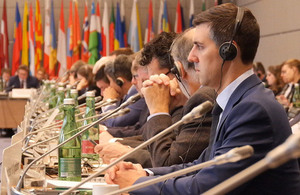UK Intervention at the 74th Joint FSC/PC Meeting
Delivered by Ambassador Neil Bush during the 74th Joint Meeting of the Forum for Security Co-operation and the Permanent Council, 29 May 2019.

Ambassador Neil Bush
Mr Chairman, I would like to thank the Tajik FSC Chair and the Slovak OSCE Chairmanship for convening today’s joint FSC/PC on the Structured Dialogue.
I would also like to thank Ambassador Boender and his team for an extremely well organised Structured Dialogue Informal Working Group and Expert Level Workshop on 6 and 7 May, and for the Interim Report he issued last week.
The UK subscribes to the EU statement but I would like to make a few remarks in my national capacity.
The UK continues to value the Structured Dialogue as a forum for discussion of the current and future challenges and risks to security in the OSCE area. We also reiterate our support for Ambassador Huynen’s “guiding principles” for the Structured Dialogue, which we are pleased to see reproduced in the Interim Report.
We draw five conclusions from the extensive exchanges during the May Structured Dialogue meeting:
First, participating States have a shared concern about the current state of European security and see the reduction of military risk as a priority for further discussion at Structured Dialogue.
Second, participating States overwhelmingly called for full respect for fundamental OSCE principles, and full implementation, in letter and spirit, of existing politico-military commitments.
Third, there was also overwhelming support for modernisation of the Vienna Document. This remains a priority for the UK, as an important step towards increasing military transparency and reducing risk for us all. We continue to call on the Russian Federation to reverse its political opposition to Vienna Document modernisation and to engage constructively with other OSCE participating States.
Fourth, participating States made a number of other practical suggestions for beginning the process of rebuilding trust and reducing military risk. We are ready to explore these ideas further but remain realistic about how much can be achieved and at what pace. We note, once again, that voluntary measures cannot substitute for mandatory commitments, and that reciprocity is an essential principle.
Finally, political will from all participating States to engage constructively and in good faith remains the key to unlocking progress at OSCE on European Security. Without it, real progress will remain elusive.
I would like to take a moment to respond to some comments we have heard this morning. The security challenges we currently face are not somehow the fault of NATO or of NATO Allies. NATO is not a threat to Russia: it is a defensive Alliance which is transparent and consistent. NATO does not want a new arms race with Russia or a new Cold war. NATO’s actions from 2014, were a proportionate, measured and defensive response to Russia’s actions, in line with existing agreements. Russia’s actions also left NATO with no choice but to suspend practical co-operation with Russia.
Mr Chairman, OSCE is the home of conventional arms control and confidence and security building measures. We have the platforms and the instruments we need to make progress. You may rest assured that my Delegation in Vienna will continue to work to do so.